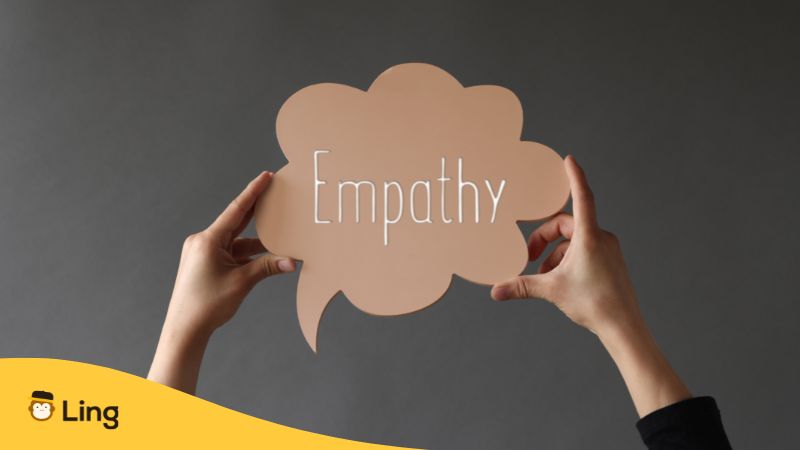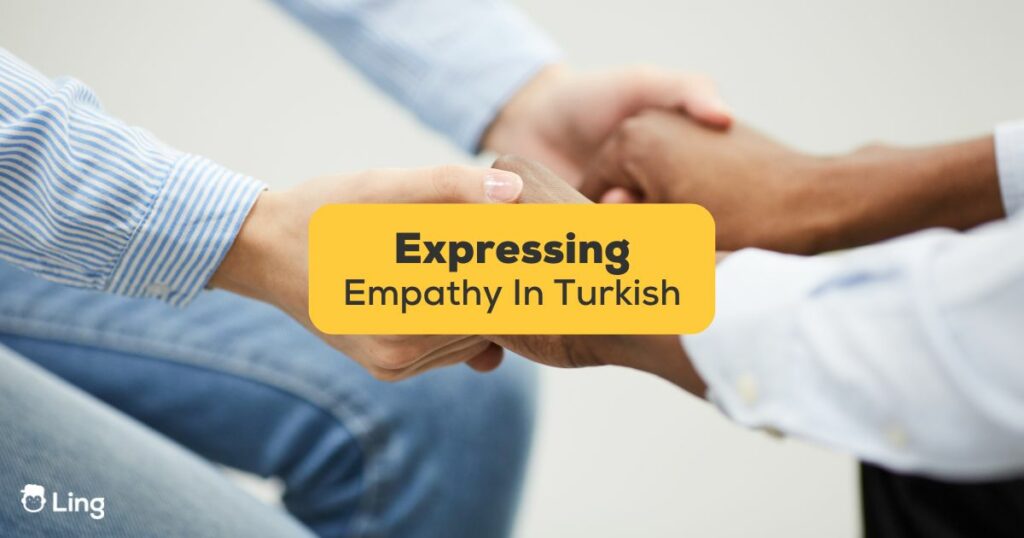In every language, the ability to empathize—understand and share other people’s feelings—is essential to achieving good communication, developing relationships, and creating a sense of trust. Due to cultural conventions, customs, and beliefs, empathy is expressed in different ways across cultures. In today’s blog post, you will learn phrases for expressing empathy in Turkish.
Table of Contents
Examples Of Empathy In Daily Life
Sharing someone else’s delight: Empathy is the ability to feel the happiness of someone who has received good news or is experiencing a wonderful moment. You celebrate selflessly and truly for that person’s well-being, even if the scenario does not directly benefit or affect you.
Helping someone with a personal or professional problem: Everyone is afflicted by a work or personal problem at some point in their lives. Helping and listening to people suffering from such conditions will greatly benefit them. Empathizing with that person and putting yourself in their shoes will help you comprehend what is happening in their life.
Giving a bus seat to a pregnant woman: When a woman is pregnant, and her condition has progressed, she will experience more exhaustion and fatigue than normal. If a person gives up their seat to her, it means that person is considering how the woman feels and empathizes with her.

Phrases For Expressing Empathy In Turkish
Here are common phrases used for expressing empathy in Turkish, together with their translations:
1. May it be in the past – Geçmiş Olsun
This phrase is used to wish someone well after they have experienced a hardship, such as an illness or an accident. It literally means “may it be in the past,” signifying hope for recovery and better times ahead.
2. May your head stay healthy – Başınız sağ olsun
Often used to offer condolences to someone who has lost a loved one, this phrase means “may your head stay healthy,” implying a wish for strength and endurance during a time of grief.
3. May God give you patience – Allah sabır versin
This expression, meaning “may God give you patience,” is used to comfort someone going through a difficult period, suggesting that divine support will help them endure their hardship.
4. I’m sorry – Üzgünüm
A simple yet powerful way to express sorrow or regret, “üzgünüm” means “I am sorry.” It is used in various situations to show empathy and acknowledge the other person’s pain or disappointment.
5. I am with you – Yanındayım
This phrase, meaning “I am with you,” is used to assure someone that they are not alone in their struggles and that they have support.
6. Geçmişler olsun
Similar to “geçmiş olsun,” but often used in plural form to emphasize collective well-wishes, especially after a significant event affecting multiple people.
7. Take care of yourself – Kendine iyi bak
Meaning “take care of yourself,” this phrase is often used to express concern and encourage someone to look after their well-being.
8. May God give you healing – Allah şifa versin
This means “may God give you healing” and is often used to wish someone a speedy recovery from an illness or injury.
9. I’m praying for you – Senin için dua ediyorum
Meaning “I am praying for you,” this phrase shows spiritual support and solidarity during difficult times.
10. I’m always with you – Her zaman yanındayım
This phrase, meaning “I am always with you,” reassures someone of continuous support and presence.
11. Don’t be sad – Üzülme
Meaning “don’t be sad,” this phrase is used to comfort and uplift someone who is feeling down.
12. I am here for you – Senin için buradayım
This phrase, meaning “I am here for you,” reinforces the idea of being available and supportive during challenging times.
13. I share your pain – Acını paylaşıyorum
This means “I share your pain” and is used to express deep empathy and solidarity with someone suffering from a loss or hardship.
14. I wish you patience – Sabır diliyorum
“Sabır diliyorum” is often used to offer strength and encouragement during trying times.
15. My heart is with you – Kalbim seninle
This phrase, meaning “my heart is with you,” expresses deep emotional support and connection with someone going through a tough period.
How Do You Say “Emphaty” In Turkish?
The Turkish word for “empathy” is empati which is very similar to its English equivalent. Empathy is best described as putting yourself in one’s shoes (kendini başkasının yerine koymak) in Turkish culture.
Frequently Asked Questions
1. What is empathy?
Empathy is defined as understanding another person’s emotions and reacting to them in a positive way. It is an important feature that facilitates communication between people and helps develop relationships.
2. What is empathy vs sympathy?
Empathy is the ability to understand and share someone else’s feelings as if you were in their shoes. Sympathy, on the other hand, is feeling pity or sorrow for someone else’s misfortune, but not necessarily sharing or understanding their feelings.
3. What is the meaning of an empathetic person?
An empathetic person is someone who can understand and feel what another person is experiencing from their perspective. They are able to connect with others on an emotional level and offer genuine support and understanding.
Final Thoughts On Expressing Empathy In Turkish
I hope this article will help you show your empathy in Turkish society. Even though you are not a fluent Turkish speaker, don’t hesitate to say geçmiş olsun or kendine iyi bak whenever you see someone dealing with issues in life. Expressing empathy in Turkish and showing support are important values that are highly appreciated and remembered in Turkish culture!
































































